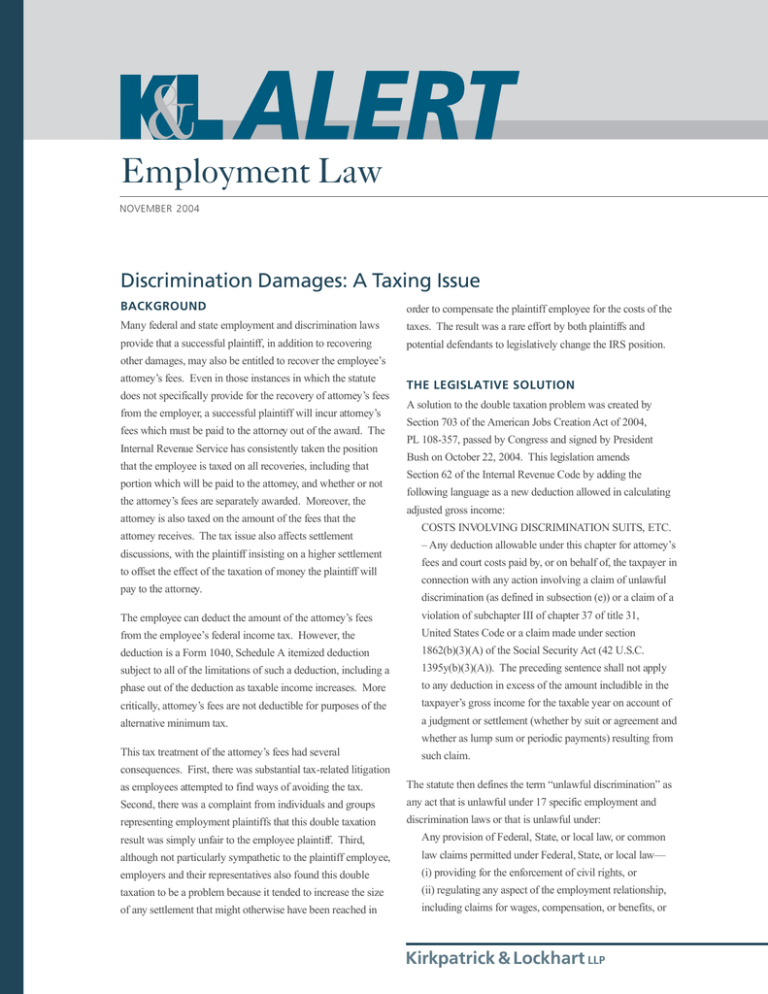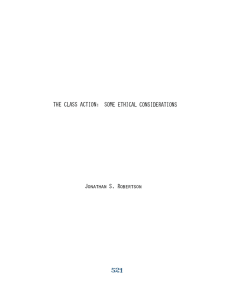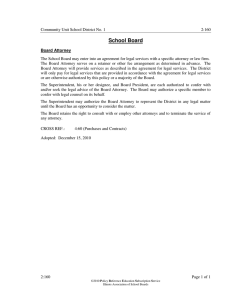
Employment Law
NOVEMBER 2004
Discrimination Damages: A Taxing Issue
BACKGROUND
order to compensate the plaintiff employee for the costs of the
Many federal and state employment and discrimination laws
taxes. The result was a rare effort by both plaintiffs and
provide that a successful plaintiff, in addition to recovering
potential defendants to legislatively change the IRS position.
other damages, may also be entitled to recover the employee’s
attorney’s fees. Even in those instances in which the statute
does not specifically provide for the recovery of attorney’s fees
from the employer, a successful plaintiff will incur attorney’s
fees which must be paid to the attorney out of the award. The
Internal Revenue Service has consistently taken the position
that the employee is taxed on all recoveries, including that
portion which will be paid to the attorney, and whether or not
the attorney’s fees are separately awarded. Moreover, the
attorney is also taxed on the amount of the fees that the
attorney receives. The tax issue also affects settlement
discussions, with the plaintiff insisting on a higher settlement
to offset the effect of the taxation of money the plaintiff will
pay to the attorney.
THE LEGISLATIVE SOLUTION
A solution to the double taxation problem was created by
Section 703 of the American Jobs Creation Act of 2004,
PL 108-357, passed by Congress and signed by President
Bush on October 22, 2004. This legislation amends
Section 62 of the Internal Revenue Code by adding the
following language as a new deduction allowed in calculating
adjusted gross income:
COSTS INVOLVING DISCRIMINATION SUITS, ETC.
– Any deduction allowable under this chapter for attorney’s
fees and court costs paid by, or on behalf of, the taxpayer in
connection with any action involving a claim of unlawful
discrimination (as defined in subsection (e)) or a claim of a
The employee can deduct the amount of the attorney’s fees
violation of subchapter III of chapter 37 of title 31,
from the employee’s federal income tax. However, the
United States Code or a claim made under section
deduction is a Form 1040, Schedule A itemized deduction
1862(b)(3)(A) of the Social Security Act (42 U.S.C.
subject to all of the limitations of such a deduction, including a
1395y(b)(3)(A)). The preceding sentence shall not apply
phase out of the deduction as taxable income increases. More
to any deduction in excess of the amount includible in the
critically, attorney’s fees are not deductible for purposes of the
taxpayer’s gross income for the taxable year on account of
alternative minimum tax.
a judgment or settlement (whether by suit or agreement and
whether as lump sum or periodic payments) resulting from
This tax treatment of the attorney’s fees had several
such claim.
consequences. First, there was substantial tax-related litigation
as employees attempted to find ways of avoiding the tax.
The statute then defines the term “unlawful discrimination” as
Second, there was a complaint from individuals and groups
any act that is unlawful under 17 specific employment and
representing employment plaintiffs that this double taxation
discrimination laws or that is unlawful under:
result was simply unfair to the employee plaintiff. Third,
Any provision of Federal, State, or local law, or common
although not particularly sympathetic to the plaintiff employee,
law claims permitted under Federal, State, or local law—
employers and their representatives also found this double
(i) providing for the enforcement of civil rights, or
taxation to be a problem because it tended to increase the size
(ii) regulating any aspect of the employment relationship,
of any settlement that might otherwise have been reached in
including claims for wages, compensation, or benefits, or
Kirkpatrick & Lockhart LLP
prohibiting the discharge of an employee, the
question as to the correct tax treatment of compensatory and
discrimination against an employee, or any other form of
punitive damage awards.
retaliation or reprisal against an employee for asserting
rights or taking other actions permitted by law.
CONCLUSION
The new legislation accomplishes several goals. First, it
Congress has resolved one taxation issue present in nearly all
eliminates the double taxation of that portion of fees and costs
employment cases, viz., does the plaintiff have to pay income
which go ultimately to the plaintiff’s attorney. Second, by
tax on that portion of his/her recovery that will be used to pay
eliminating the effect of the tax on the employee’s recovery,
attorney’s fees. The resolution is not applicable to awards and
the negative effect of the tax need no longer be included in a
payments occurring before October 22, 2004, and leaves
plaintiff’s calculations of an acceptable settlement amount, a
unanswered some related tax issues.
factor which should allow for settlement of discrimination
HAYES C. STOVER
claims at a lower net cost to the employer. Third, it will
hstover@kl.com
eliminate the need for creative settlement schemes, such as a
412.355.6476
separate payment for attorney’s fees in a settlement, which
may or may not have successfully avoided the double taxation.
UNRESOLVED ISSUES
Although Section 703 will resolve one of the most contentious
issues in the arena of taxation of discrimination payments, the
legislation does not resolve all issues. First and foremost, the
legislation is prospective only. The charge is applicable only to
fees and costs paid after the date of enactment with respect to
any judgment or settlement occurring after the enactment date.
The United States Supreme Court has agreed to hear two cases
this term in which the issue of the correct tax treatment for
contingent attorney’s fees will be addressed. Whether these
decisions will resolve the question of proper taxation for events
prior to the recent legislation remains to be seen.
Several other issues are left unaffected by the new legislation.
First, is the payment to the employee to be treated as wages
with a corresponding W-2, or should it be treated as non-wage
income with the employer submitting a Form 1099 to the
Internal Revenue Service? This issue implicates the question
of withholding of the income tax which may be due. A
second, related dispute concerns whether such damage
FOR MORE INFORMATION, please contact one of the
following K&L lawyers:
Boston
Henry T. Goldman
617.951.9156
hgoldman@kl.com
Dallas
Jaime Ramón
214.939.4902
jramon@kl.com
Harrisburg
Carleton O. Strouss
717.231.4503
cstrouss@kl.com
Los Angeles
Thomas H. Petrides
310.552.5077
tpetrides@kl.com
Paul W. Sweeney, Jr. 310.552.5055
psweeney@kl.com
Miami
Daniel A. Casey
305.539.3324
dcasey@kl.com
Newark
Rosemary Alito
973.848.4022
ralito@kl.com
Vincent N. Avallone 973.848.4027
vavallone@kl.com
Marilyn Sneirson
973.848.4028
msneirson@kl.com
New York
David R. Marshall
212.536.4066
dmarshall@kl.com
Rory J. McEvoy
212.536.4804
rmcevoy@kl.com
Pittsburgh
Stephen M. Olson
412.355.6496
solson@kl.com
Michael A. Pavlick
412.355.6275
mpavlick@kl.com
Hayes C. Stover
412.355.6476
hstover@kl.com
San Francisco
Jonathan M. Cohen
415.249.1029
jcohen@kl.com
Washington
Lawrence C. Lanpher 202.778.9011
llanpher@kl.com
payments are wages requiring both the employer and
employee to pay their respective shares of social security taxes.
The attorneys resident in all offices, unless otherwise indicated,
are not certified by the Texas Board of Legal Specialization.
Although in dollar terms not as large an issue as the income
tax treatment, the question as to whether or not the employer
and the employee must pay social security taxes on payments
®
to the employee becomes a point of contention especially
Kirkpatrick & Lockhart LLP
when the settlement involves smaller amounts in which the
Challenge us. ®
social security payments represent a higher percentage of the
total payment. Finally, the legislation does not address the
BOSTON
■
DALLAS
■
HARRISBURG
■
LOS ANGELES
■
MIAMI
■
www.kl.com
NEWARK
■
NEW YORK
■
PITTSBURGH
■
SAN FRANCISCO
■
WASHINGTON
.................................................................................................................................................................
This publication/newsletter is for informational purposes and does not contain or convey legal advice. Please note that information
about prevailing law is limited to the particular state or federal jurisdiction(s) covered by the cited law and cases, and stricter
rules may apply in some states. This newsletter should not be relied upon in regard to any particular facts or
circumstances without first consulting a lawyer.
2
KIRKPATRICK & LOCKHART LLP EMPLOYMENT LAW ALERT
2
© 2004 KIRKPATRICK & LOCKHART LLP.
ALL RIGHTS RESERVED.




